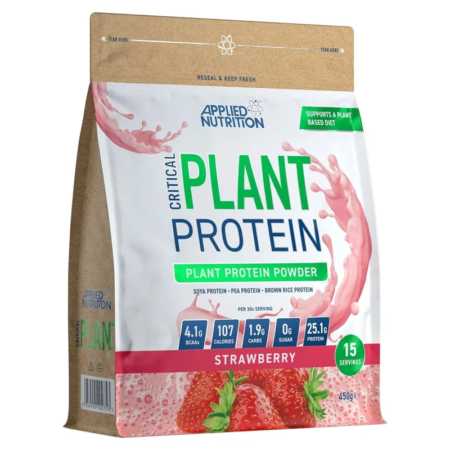Soy Protein
Derived from soya beans, soya protein is a complete protein, which means it contains all nine essential amino acids necessary for human health. This makes it an excellent alternative to animal proteins, especially for vegetarians and vegans who need to ensure adequate protein intake for muscle repair, maintenance and overall health.
In addition, soya protein is generally low in fat and free from cholesterol and lactose, making it a suitable option for those with specific dietary restrictions or allergies related to dairy products. This combination of benefits makes soya protein a versatile and healthy component of many diets. It is a cholesterol-free protein source that is also non-GMO and allergen-free.
WHAT IS SOYA PROTEIN?
Soya protein is a high-quality, plant-based protein extracted from soya beans. It is considered a complete protein because it contains all nine essential amino acids that your body cannot produce on its own. These amino acids are critical for building and repairing tissue, producing enzymes and hormones, and supporting a healthy immune system. For more information on proteins, visit our protein guide.
Soya protein is also vegan-friendly and a great choice for those following a plant-based diet. It is an excellent source of protein for those looking for non-animal protein sources. In addition, it is a weight management-friendly choice as it can help you feel full and satisfied without the extra calories and unhealthy fats found in some animal proteins.
Does soya provide protein amino acids?
Yes, soya products are rich in amino acids. In fact, soya protein is one of the few plant proteins that provides all the essential amino acids your body needs.
Here are some key benefits of soya protein:
- Complete protein source: contains all nine essential amino acids.
- Cholesterol-free: Good for heart health.
- Low fat: Helps with weight management.
- Non-GMO: Free from genetically modified organisms.
- Allergen-free: Safe for people with common food allergies.
- Vegan-friendly: Ideal for those on a plant-based diet.
- Menopause-friendly: Can help manage symptoms of the menopause.
HEALTHY BENEFITS OF SOY PROTEIN
As a complete protein, soy protein is a nutritional powerhouse. It provides all nine essential amino acids that your body cannot produce on its own, making it a staple in many plant-based diets. This is especially important for those following a vegan or vegetarian lifestyle. The protein in soya is comparable to that found in animal products, but has the added benefit of being cholesterol-free.
Additionally, soya protein is a natural, non-GMO food source, making it a healthier choice compared to many processed protein supplements. It is also a great aid in weight management, as it can help you feel full and satisfied without the high fat and calorie content of some animal proteins. Studies have also suggested that soya protein can be beneficial during menopause, providing relief from common symptoms.
How much soya protein per day is safe?
According to nutritionists, an adult needs about 0.8 grams of protein per kilogram of body weight per day. Given its high protein content, soya can contribute significantly to meeting this target. However, as with any food, it is important to consume soya protein in moderation. Although it is generally safe for most people, excessive intake can cause digestive problems or interfere with nutrient absorption.
Remember, variety is the key to a healthy diet. Therefore, although soya protein is a great supplement, it should be part of a balanced diet that includes a mix of different proteins. If you have specific health concerns or dietary restrictions, it is always best to consult a health professional or registered dietitian.
How much soya protein per day is safe?
According to nutritionists, an adult needs about 0.8 grams of protein per kilogram of body weight per day. Given its high protein content, soya can contribute significantly to meeting this target. However, as with any food, it is important to consume soya protein in moderation. Although it is generally safe for most people, excessive intake can cause digestive problems or interfere with nutrient absorption.
Remember, variety is the key to a healthy diet. Therefore, although soya protein is a great supplement, it should be part of a balanced diet that includes a mix of different proteins. If you have specific health concerns or dietary restrictions, it is always best to consult a health professional or registered dietitian.
IS SOYA PROTEIN BETTER FOR YOU THAN WHEY?
The choice between soya protein and whey often comes down to personal preference and dietary needs. Both are high-quality proteins, but offer different benefits. Soya protein, for example, is a vegan-friendly option that is also allergen-free, making it a great choice for those with dairy allergies or lactose intolerance.
On the other hand, whey protein is derived from milk and may be more suitable for those looking to build muscle mass quickly. However, it’s important to note that soya protein can also support muscle growth and repair, making it a viable alternative for those who prefer a plant-based diet or have specific dietary restrictions.
Which foods are rich in soya protein?
Soya protein is found in a variety of foods, making it easy to incorporate into your diet. Tofu, for example, is a versatile ingredient that can be used in a range of dishes from stir-fries to desserts. It is an excellent source of soya protein, with about 10 grams in half a cup.
Other protein-rich soya products include tempeh, edamame and soya milk. Soy protein is also available in powder form, which can be added to smoothies or used in baking. Be sure to check labels for amino acid content and make sure you’re getting a complete protein source.













